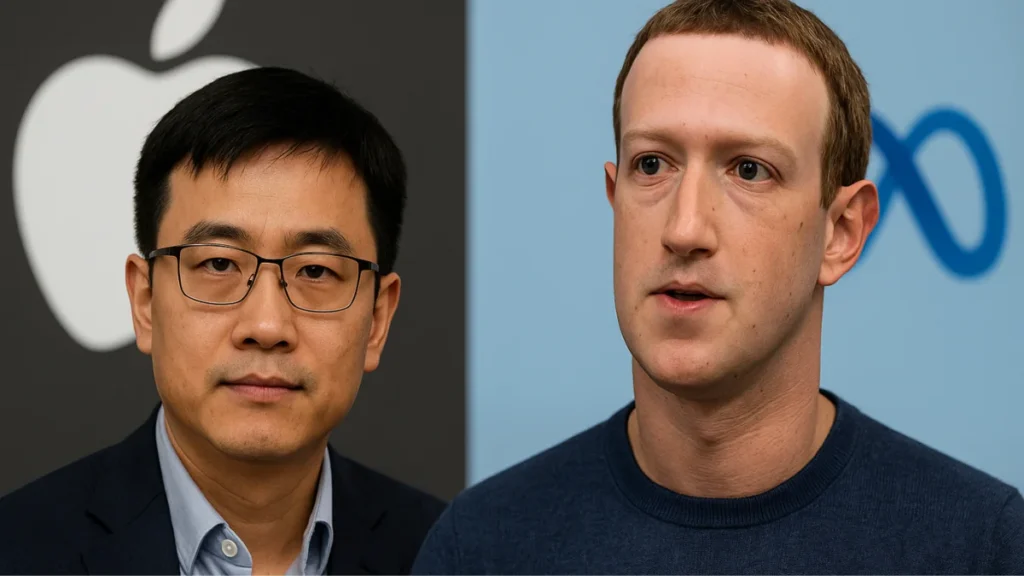Apple is facing a major blow to its artificial intelligence ambitions. Ruoming Pang, the engineer leading Apple’s foundation models team, is leaving for Meta. And it’s not just any exit—Meta reportedly offered Pang a compensation package worth tens of millions of dollars per year. This high-profile move could trigger a broader exodus from Apple’s AI ranks and highlights the intensifying war for top AI talent in Silicon Valley.
Key Takeaways:
- Ruoming Pang, head of Apple’s foundation models team, is joining Meta.
- Meta reportedly offered Pang tens of millions per year.
- Apple’s AI morale is low, and more engineers may follow Pang out.
- Pang’s departure could reshape Apple’s internal AI structure.
- Meta continues aggressive hiring, eyeing AI “superintelligence.”
Apple is scrambling to hold onto its AI edge—and it just lost one of its most important players.
Ruoming Pang, the engineer behind Apple’s core AI foundation models, is leaving for Meta. According to sources familiar with the matter, Meta offered Pang a package in the tens of millions per year—a staggering amount that underscores just how heated the AI talent war has become.
Meta CEO Mark Zuckerberg is going all-in on AI, making it the company’s top priority. He’s been personally involved in the recruitment process, hosting top candidates at his homes and offering eye-popping compensation deals. Pang is the latest big-name recruit, joining a new superintelligence group alongside prominent AI leaders like Alexandr Wang (Scale AI), Daniel Gross, and Nat Friedman.
Meta confirmed Pang’s hiring late Monday. Apple, however, hasn’t commented—and that silence speaks volumes.
Apple’s AI Foundation Is Shaking
Pang joined Apple in 2021 after leaving Alphabet, and quickly became a key figure in Apple’s AI roadmap. He led a team of around 100 engineers developing large language models powering Apple Intelligence, including new features for email summaries, Genmoji, and Siri enhancements.
But internally, Apple’s AI efforts have faced tension. The Foundation Models team—also known as AFM—has recently been scrutinised by new leadership exploring third-party AI partnerships. The company is considering replacing its in-house models with tech from OpenAI or Anthropic to power the next version of Siri.
This shift has reportedly lowered morale. Several engineers on Pang’s team have told colleagues they’re considering jumping ship—some even to Meta. And last month, Pang’s deputy, Tom Gunter, left the company.
Big Changes in Apple’s AI Org
With Pang out, Apple’s AI division is being restructured. Zhifeng Chen will now lead the AFM team, but unlike Pang—who managed most engineers directly—the new setup introduces multiple managers between engineers and leadership. Names floated for these roles include Chong Wang, Zirui Wang, Chung-Cheng Chiu, and Guoli Yin.
Meanwhile, Apple’s AI oversight now falls largely to software chief Craig Federighi and Mike Rockwell, the visionary behind the Apple Vision Pro headset. Pang’s former boss, John Giannandrea, once a Google AI veteran, has been sidelined in recent months after delays and underwhelming reception to Apple’s AI rollout.
Meta’s AI Ambitions Keep Growing
Zuckerberg has made it crystal clear: AI is Meta’s future. The company has not only invested tens of billions in AI infrastructure—such as chips and data centres—but it has also recruited top talent from OpenAI, Anthropic, and other leading AI startups.
The push is centred on developing “superintelligence”—AI that can rival or surpass human capabilities. And Zuckerberg’s team is aggressively building that future by recruiting the best, no matter the cost.
Why This Matters
Ruoming Pang’s departure may seem like just another tech exit, but in the bigger picture, it’s a seismic shift. His loss could delay or derail Apple’s homegrown AI ambitions, especially at a time when rivals are racing ahead. Meta’s gain is Apple’s loss, and it signals that Silicon Valley’s AI arms race is just getting started.
With morale dipping and Apple leaning more on third-party models, the question remains: Can Apple still innovate in AI from the inside out, or will it become a customer of its own competitors?
As the AI talent wars escalate, one thing is clear—the future of artificial intelligence will be shaped not just by code, but by who controls the talent.
